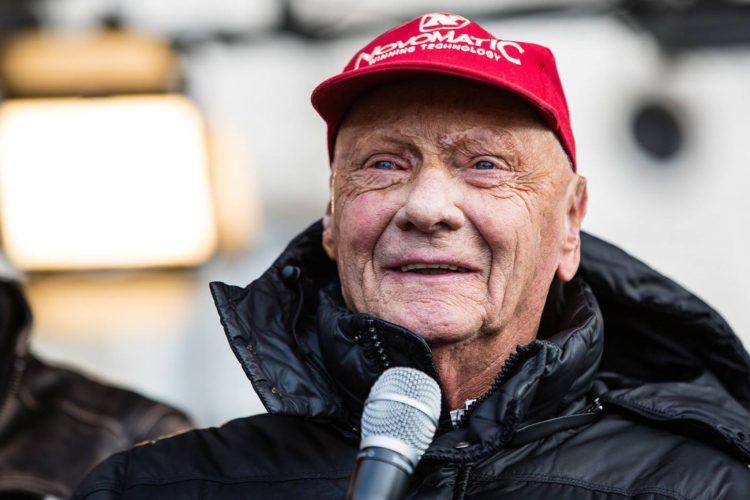Andreas Nikolaus “Niki” Lauda died on May 20th 2019. In many ways, grand prix racing was forever changed by his time spent behind the wheel. Nicknamed “The Rat” not because of his appearance (although he had more than a passing resemblance to a rodent) but because of his personality. Niki was as tough, focused, and uncompromising off the track as he was on it. He was, in short, a real sonofabitch.
Sorry, scratch that. He was, in short, a real fast sonofabitch.
The Rat: Fast & Furious
If you’ve seen the movie Rush (which, if you haven’t you really should) then you know who Niki is. He’s one of the co-stars in what is (unbelievably) a pretty good movie and a very good racing movie. Austrian by birth and Germanic by temperament, he was, by turns, cold, calculating, scheming, abrasive, abrupt, insulting, pointed, emotionless, shrewd, devious, brusque, terse, insolent, rude, and critical.
People did call Niki a number of things, but no one, and I mean no one, ever called him slow. He had a drive and will to succeed that was, upon first exposure, almost vulgar in its presentation and manner. If for some reason, you were faster than him, he would, like a computer, start calculating. He’d talk with engineers, he’d upbraid the mechanics, he would figure out what, if anything, was wrong with his car; imperiously demand it be made just to his liking, and then, when he was faced with the inescapable conclusion that he, Niki “The Rat” Lauda, was slow, he would simply go out and will himself to be faster.
It was a frightening combination of personal drive and Teutonic belligerence, combined with a cold-blooded killer instinct that saw Niki work his way to the top.
No Questions, No Compromises
A specific scene in Rush drives this home. When the drivers are debating whether to even race at the Nürburgring because of horrid wet conditions, at one point, Niki steps up and says (in so many words) ‘Why debate this? We already know who’s the fastest.’ “Because I’m quicker than all of you.” “Because I’m quicker than all of you,” is a direct quote. Not just from the movie, but from real life. It wasn’t a brag or a boast; that wasn’t a statement meant to knock his competitors off balance, that was a simple statement of fact. Niki was the fastest man ever around The Ring until years later. To him, saying something like that had no emotional weight to it.
Near as I could tell, he was devoid of empathetic understanding. If you took something personally that Niki said about you, then that was on you, not him. If you feel insulted, well, the truth hurts, don’t it buttercup?
The Comeback Kid
Niki made, in terms of a career, the biggest single comeback in the history of sports. At that very same race where he declared his superior speed, the 1976 German Grand Prix at the Nürburgring, Lauda crashed heavily at a kink just before the Bergwerk corner (now informally referred to as Lauda’s Kink).
His car, a Ferrari 312T, slammed into the barrier, got run into by Brent Lunger’s car, more or less broke up and then exploded. He suffered severe burns to his head and inhaled hot toxic gases that damaged his lungs and polluted his blood. He burned his right ear off and both eyelids. There was extensive scarring from the burns to his head; the hair on the right side of his head and both eyebrows were gone. One lung was completely collapsed and both were filled with the byproducts of your mucus membranes trying to cope with burning race fuel.
Lauda was conscious throughout and able to stand, but later lapsed into a coma. On the way to the hospital, a priest read him the last rites. Two days later, a different priest read them to him again. As far as the Catholic Church was concerned, Niki Lauda was dead. Twice. Only Niki didn’t want to die.
He had his lungs drained and vacuumed out three times without anesthetic. He limited the reconstructive surgery to replacing the eyelids only, since he needed them to drive. Since the rest of his head looked like something from a napalm test, he wore a cap to cover the scars and, get this, sold the space on the front to sponsors for advertising. Six weeks after his crash at The Ring, he was back in a race car for the Italian Grand Prix at Monza. Six. Figgin’. WEEKS.
Why? Because Niki wanted to, that’s why.
Jack of All Trades
He lost the chance for back-to-back championships that year in 1976 because he pulled out of the Japanese GP, handing the championship to his archrival James Hunt. And after that season? He won the World Championship again, for the second time. Then he retired. Then he came back. Won the World Championship again for a third time. Really retired. Started an airline. Sold the airline and was somehow involved in the current Mercedes F1 program in a made up role of “non-executive chairman,” which means he was around to call BS where he saw BS, no matter who it torqued off.
Niki was as honest as he was fast, brutally so in both cases.
Lauda died in his sleep at the University Hospital of Zürich while undergoing dialysis treatment after a period of ill health according to Süddeutsche Zeitung. Or, as the paper succinctly, truthfully, and perhaps even coldly put it: “Niki Lauda ist tot.”
Tony Borroz has spent his entire life racing antique and sports cars. He is the author of Bricks & Bones: The Endearing Legacy and Nitty-Gritty Phenomenon of The Indy 500, available in paperback or Kindle format. Follow his work on Twitter: @TonyBorroz.
from Automoblog.net https://www.automoblog.net/2019/05/22/remembering-niki-lauda/
via IFTTT
from Tumblr https://peternpalmer.tumblr.com/post/185062196656
via IFTTT


No comments:
Post a Comment